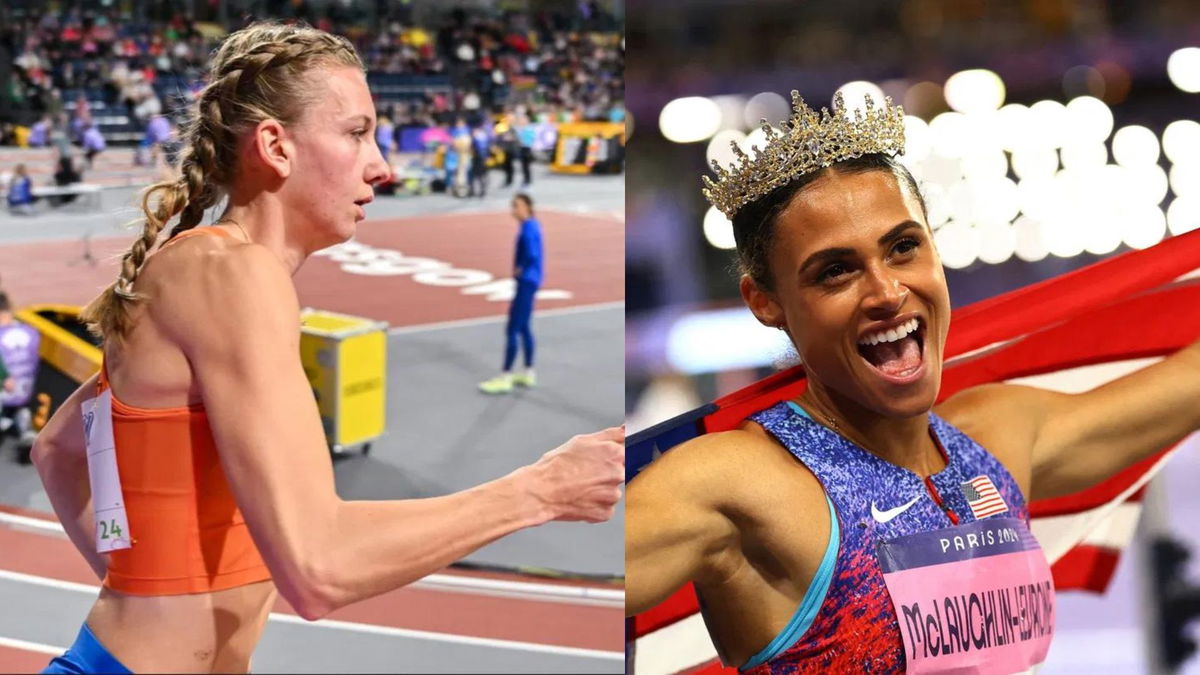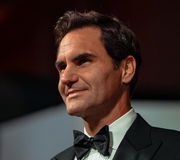

The name Femke Bol evokes a sense of reverence among track and field fans and for good reasons. The Dutch hurdler had two World Championships gold medals under her belt going into the 2024 Paris Olympics and was set to become the biggest rival of the USA’s hurdling phenom Sydney McLaughlin-Levrone in the 400mH race in the French capital as well. However, things didn’t pan out as the 24-year-old would have hoped for. She was handed a sound defeat by not one, but two American hurdlers in the race.
Watch What’s Trending Now!
Sydney McLaughlin-Levrone breezed to a dominant first-place finish in Paris, clocking an impressive 50.37 seconds breaking the world record for the sixth time. But Bol had to bow out to the silver medalist Anna Cockrell (51.87s) as well, eventually finishing the race with a disappointing 52.15 seconds. “Gave it my all, and left my heart on the track. It’s not the race and result I came for and that hurts,” Bol wrote on Instagram after that. But did she take that pain to keep her country over personal triumphs?
On August 15, Retired track runner and five-time Olympic medalist Justin Gatlin appeared for an episode of the Ready Set Go podcast with Bahamian sprinter and analyst Rodney Green. On the podcast’s YouTube channel, the two talked about what might have caused a fall in the performance of Femke Bol. Rodney argued that running the 4x400m mixed relay to fetch gold to the country days before the 400mH finals might have some bearing on the outcome. Notably, Femke ran a blistering 47.93s split in the anchor leg of the race.
ADVERTISEMENT
“Not giving her any excuses but you know you go in into that type of wheelhouse at the beginning of the Olympics, it take something out of your legs,” Rodney stated. “She definitely wanted to put on for her country. If Femke doesn’t do that, her country doesn’t get gold, you know, what I mean and I think her legs might have been a little spent,” he further added. In fact, Femke’s statement after the race reflected that very patriotism.
While Femke was getting all the cheer for running the split, she did not give her that much importance. Instead, she stated that in relay it is the team effort that makes all the difference. In the mixed relay in last year’s World Championships in Budapest, Femke had a dramatic fall, which cost her team the gold. This time, Femke and the team avenged that. Her allegiance to the team became all the more prominent when she recalled how the debacle motivated her this time.
ADVERTISEMENT

ADVERTISEMENT
When Femke was asked what she was thinking of going into the final 100m of the race, she said, “Just keep going, keep going. And my general anger from Budapest! That and my teammates cheering me. And the atmosphere in this stadium is absolutely incredible. It’s crazy. So everything together.” While all this is laudable, Justin Gatlin did not fail to recognize the gravity of missing a personal milestone.
“I know Femke Bol was hurt you know, and she didn’t see it going the way that she thought it was going to go,” said Gatlin, highlighting that even he was looking forward to seeing the Dutch star making ripples on the track at the event. However, all is not lost, Justin opines.
Claiming that this isn’t the end of the road for the hurdle specialist, Gatlin went on to say, “…you watch the growth of Femke Bol. Like, she did an amazing job throughout the season, the year before that. Like don’t take her growth for granted: she has done an amazing job and I think that’s not the last that we’ve seen of her.” Femke’s progression in the 400mH might give you some context to Gatlin’s comments.
ADVERTISEMENT
In 2019, Femke had finished the 400mH race in 55.32s at the Khalifa International Stadium, Doha. In five years she had brought the time down to 50.95s that she ran in the Stade de La Charrière, La Chaux-de-Fonds last month. In fact, alongside Sydney McLaughlin-Levrone, she is the only hurdler to have run the race in below 51 seconds. But would it be easy for Femke to overcome Sydney so easily? Probably not.
Is Sydney McLaughlin-Levrone too daunting a challenge for Femke Bol?
400mH is considered one of the most difficult races around for a reason. Apart from physical capabilities, it demands a flexible mind to quickly maneuver one’s movements as the situation demands. And Sydney looks to be ahead of her peers in all these counts. The way she has changed her stride patterns over the years speaks volumes about her agility.
ADVERTISEMENT
Back in 2019, Sydney had a stride pattern, typical of the elite hurdlers — 15 strides through hurdle seven, then 16 strides (alternating lead legs) the rest of the way. By 2021, there was a distinct change in this pattern. She started taking 14 strides for the first five hurdles, and 15 strides over the last five. Apparently, the 14-stepping in half of the race is what separated her from her competitors, like Dalilah Muhammad and Femke Bol. During the same time, Femke was taking 15 all the way. Come 2024, Sydney added more variety to it.
She takes 14 steps between the second and seventh hurdles and then 15 steps between the final three. So does that mean Bol also has to introduce 14-stepping into her regime? One can not guarantee the same outcomes.
Top Stories
Greg Biffle’s $4M Worth Prized Possession Still Without a Buyer Leaves NASCAR Fans Heartbroken

LIV Golf Braces for Another Possible Exit in Wake of Brooks Koepka Departure

Sean Payton Announces Retirement Plans as Broncos HC Demands Improvement From Bo Nix & Co. Before Playoffs

Biff Poggi All But Confirms Bryce Underwood’s Michigan Future After Announcing His Own Departure

Roger Federer Draws Criticism from Swiss Government Chief for Tourism Boom in Country

Amanda Balionis Confirms New Relationship Ending Months of Rumors

The stride pattern has paid Sydney well. But a significant consideration in the 400mH is the efficient distribution of energy. Taking fewer steps simply means shelling out more energy. What if 14-stepping early in the race exhausts Femke so much that she has to take 16 steps in the end? Moreover, it is not just a matter of steps, Sydney has one more weapon in her arsenal that keeps her ahead of the field.
ADVERTISEMENT
It is Sydney’s ability to alternate. Sydney starts the race with her right leg. But as she approaches the second hurdle, her left foot leads the attempt to clear it. This skill is a niche for very few elite hurdlers. It saves a hurdler against the bane of hurdling: the stutter step. Sydney is so proficient in leading with either leg that one can hardly distinguish which leg is the dominant leg.
This gives Sydney an easy-to-understand advantage. As she approaches the hurdles, she does not have to think about bringing in any specific leg. If these were not enough, one more element in the mix exponentially hypes up the abilities of Sydney. That is her sharp mind and ability to process things quickly. Want an evidence?
Sydney is an expert juggler. She can effortlessly juggle balls and several other staff while engaging in casual talk! This just speaks of the coordination between her mind and body, something which is of paramount importance in hurdling as well. Sydney’s high school coach Michael McCabe finds one more instance of her sound mind.
ADVERTISEMENT
One day in the college gym, Sydney picked up a basketball and made five 3-pointers in a row, McCabe recalls. “Form is terrible, but she picks up the ball and can put it in the basket because she just has that athletic IQ. She just figures it out,” the coach stated. It seems that this is probably the most natural gift that Sydney has as a hurdler. Will Femke Bol be able to find an answer to this innate talent of Sydney?
ADVERTISEMENT
ADVERTISEMENT
ADVERTISEMENT

